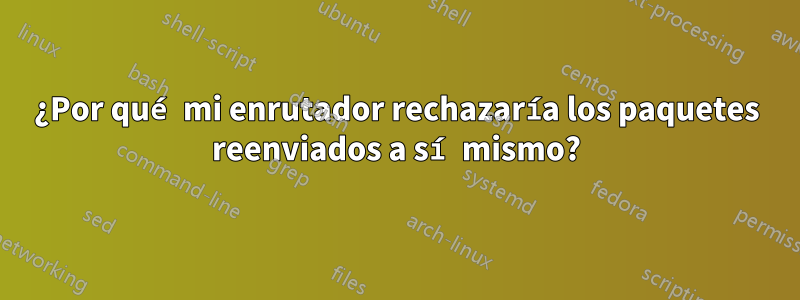
La primera regla de la cadena ADELANTE me resulta interesante. ¿Por qué sería esta una regla necesaria si la política es BAJAR?
root@tomato:/tmp/home/root# iptables -L --line-numbers
Chain INPUT (policy DROP)
num target prot opt source destination
1 REJECT tcp -- anywhere tomato multiport dports www,https,ssh reject-with tcp-reset
2 REJECT tcp -- anywhere tomato-lan1 multiport dports www,https,ssh reject-with tcp-reset
3 DROP all -- anywhere anywhere state INVALID
4 ACCEPT all -- anywhere anywhere state RELATED,ESTABLISHED
5 shlimit tcp -- anywhere anywhere tcp dpt:ssh state NEW
6 ACCEPT all -- anywhere anywhere
7 ACCEPT all -- anywhere anywhere
8 ACCEPT all -- anywhere anywhere
Chain FORWARD (policy DROP)
num target prot opt source destination
1 REJECT tcp -- anywhere tomato multiport dports www,https,ssh reject-with tcp-reset
2 REJECT tcp -- anywhere tomato-lan1 multiport dports www,https,ssh reject-with tcp-reset
3 ACCEPT all -- anywhere anywhere
4 ACCEPT all -- anywhere anywhere
5 DROP all -- anywhere anywhere state INVALID
6 ACCEPT all -- anywhere anywhere state RELATED,ESTABLISHED
7 DROP all -- anywhere anywhere
8 DROP all -- anywhere anywhere
9 wanin all -- anywhere anywhere
10 wanout all -- anywhere anywhere
11 ACCEPT all -- anywhere anywhere
12 ACCEPT all -- anywhere anywhere
Chain OUTPUT (policy ACCEPT)
num target prot opt source destination
Chain shlimit (1 references)
num target prot opt source destination
1 all -- anywhere anywhere recent: SET name: shlimit side: source
2 DROP all -- anywhere anywhere recent: UPDATE seconds: 60 hit_count: 4 name: shlimit side: source
Chain wanin (1 references)
num target prot opt source destination
1 ACCEPT tcp -- anywhere oldtimer tcp dpt:3300
Chain wanout (1 references)
num target prot opt source destination
Respuesta1
1) Las reglas son generadas automáticamente por algún programa que toma una descripción de nivel superior. No asuma que una regla es "necesaria" sólo porque aparece allí.
2) Incluso si una regla no es estrictamente necesaria, puede ser una buena práctica incluirla, para indicar explícitamente que algo no está permitido.
3) Dicho esto, puede ser realmente necesario incluir esta regla, es decir, si hay otras reglas que aceptarían el paquete antes de que se alcance el final de la tabla y se aplique la política DROP predeterminada.
En particular, las reglas 11 y 12 en la cadena FORWARD parecen idénticas y parecen aceptar todo (por lo que probablemente tengan atributos que no están enumerados; intente -Sen lugar de -L), si ese es realmente el caso, es lo mismo que una política predeterminada de ACEPTAR, por lo que tendría que descartar todo lo que desee eliminar explícitamente.


